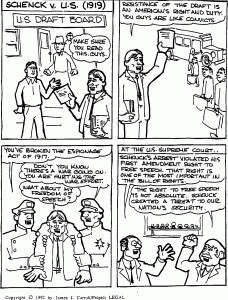September 11, 2011
The United States has been engaged in war in the Middle East for years now. A political group is making an Internet campaign through social media to tell Americans not to support the government and to oppose U.S. involvement in the Middle East. Part of the campaign is directed to convincing Americans not to join the United States Army and, therefore, make the war more difficult for the United States.
Many Americans feel that the actions of this political group are not patriotic. Some feel that this group is posing a danger to national security. Are the actions of this political group protected speech under the First Amendment?
2. Legal Background
The 1919 ruling of the Supreme Court in Schenck v. United States would say no.  In this WWI case, Charles Schenck, a leader of the Socialist Party, mailed about 15,000 anti-draft pamphlets to men in the Philadelphia area. These pamphlets spoke to the men about opposing U.S. involvement in WWI and not supporting the pro-war government. Schenck was convicted by the Supreme Court for violating the Espionage Act of 1917, which made it illegal to “wilfully cause or attempt to cause insubordination, disloyalty, mutiny, refusal of duty, in the military or naval forces of the United States” or “wilfully obstruct the recruiting or enlistment service of the United States.” Schenck argued that the Espionage Act infringed on his First Amendment right to free speech.
In this WWI case, Charles Schenck, a leader of the Socialist Party, mailed about 15,000 anti-draft pamphlets to men in the Philadelphia area. These pamphlets spoke to the men about opposing U.S. involvement in WWI and not supporting the pro-war government. Schenck was convicted by the Supreme Court for violating the Espionage Act of 1917, which made it illegal to “wilfully cause or attempt to cause insubordination, disloyalty, mutiny, refusal of duty, in the military or naval forces of the United States” or “wilfully obstruct the recruiting or enlistment service of the United States.” Schenck argued that the Espionage Act infringed on his First Amendment right to free speech.
The Supreme Court unanimously convicted Schenck on the grounds that his actions posed a clear and present danger to the United States. The court stated that otherwise legal actions and words can become criminal during wartime because they are dangerous to national security.
The 1969 case of Brandenburg v. Ohio, however, adds a new element to the discussion. In this case, the Supreme Court ruled that the First Amendment protects the right to “advocate abhorrent ideas about social, political, and economic change.” Brandenburg establishes a new test for situations like Schenck. The Brandenburg test says that advocacy of illegal actions are punishable by the government if the speech is “directed toward inciting immediate violence or illegal action and is likely to produce that action.”
3. Questions
-How did Schenck’s actions pose a clear and present danger to the United States? Did they?
-Under the precedent established by Schenck and the clear and present danger test, would the actions of our hypothetical political group be punishable? What, if any, would the clear and present danger be?
-Under the Brandenburg Test, would Schenck’s conviction have stood? Under the same test, would the actions of our hypothetical political group be punishable?
-Should anti-war speech and anti-government speech be protected during wartime?
3 thoughts on “Opposing Wartime Government”
Leave a Reply
You must be logged in to post a comment.
September 12th, 2011 at 9:43 am
It’s something of a proven fact that the rights of Americans are somewhat restricted during times of war. From Schenck to the Patroit Act, the government has always come down hard on people who oppose it during those times. But that shouldn’t be the case. Under the Brandenburg Test, I’m not sure if Schenck’s conviction would have stood. While he wasn’t asking for violence, he was asking for men to not join the army. The big thing is that he wasn’t just preaching on a soap box. He sent out 15,000 letters. that many letters can have an impact and the Test is also based on wheather a protest like this could incite violence or have a wide effect. Again, no violence, but that is a lot of letters and that might have an impact on the area. That fact alone might have made his conviction still stand.
September 14th, 2011 at 9:35 am
-Schneck’s actions were percieved as causing a clear and present danger in that if successful, it would have made the military’s forces less strong, causing a danger to the U.S.’s involvment in WWI. Being that he was advocating for men to resist the draft, as opposed to just getting men to not inlist in the war effort. this being the case I think I can see the point of the Court.
-I do think Schneck’s conviction would have held had the Brandenburg test been applied because it is illegal for men to ignore the draft when it is in use. Our hypothetical group, however, was just advocating people not join the service. There is nothing illegal there because the draft is not in use today
-Yes, because we are entitled to our believes and to share them with others.
December 15th, 2011 at 5:32 pm
Awesome job with your hypothetical!